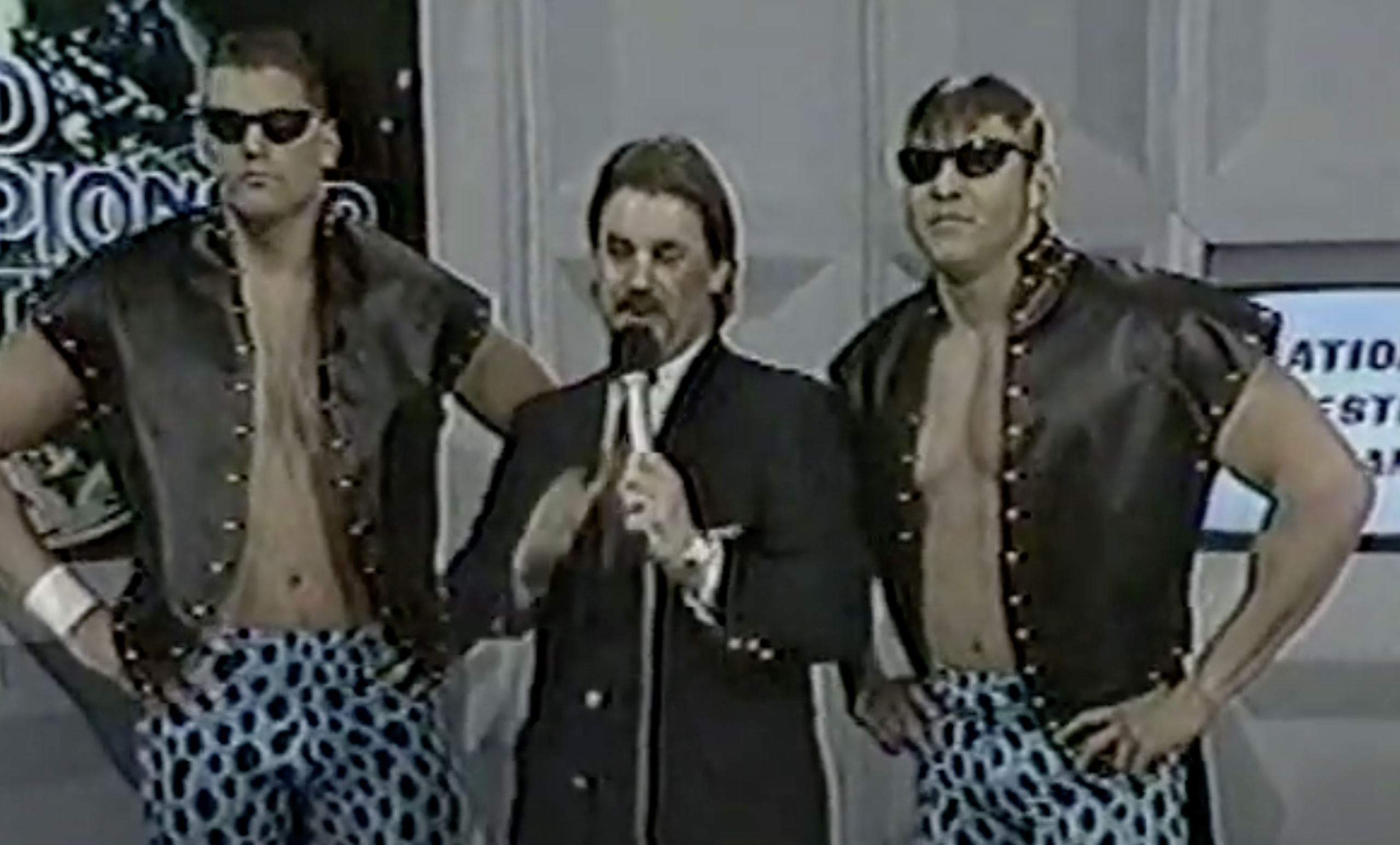Every promotion has them—the guys who look like they’ve been carved from marble, walk tall like they own the locker room, and get handed a gimmick straight from central casting. Todd Champion was one of those guys. Six-foot-six, 295 pounds, billed from WCW Special Forces, trained by Dusty Rhodes himself—he had the look, he had the pedigree, and for a hot second, it looked like he had the rocket strapped to his back. But wrestling, like war, doesn’t hand out medals for effort.
Early Skirmishes in the NWA (1986–1988)
Champion marched into Jim Crockett Promotions in ’86, a fresh recruit sent straight into combat against Ivan Koloff. It was a mismatch on paper, but Todd showed enough fire to earn a return booking—and his first televised win a month later. Still, his role was clear: cannon fodder. He was the big, clean-cut kid who could take a beating and make the veterans look like world-beaters.
That changed when he was shipped to the Central States territory. There, alongside D.J. Peterson, he captured his first piece of gold: the NWA Central States Tag Team Championship. For two months, Champion and Peterson stood tall before losing to the MOD Squad. It was a taste of victory—one that would keep Champion hungry through the years of stop-and-start booking.
Crossing Enemy Lines (1989–1991)
Champion’s path took him overseas, a proving ground in Japan and later in Mexico. In All Japan Pro Wrestling, he shared the ring with legends like Terry Gordy and Yoshiaki Yatsu. In Mexico, he donned the moniker KGB, a name that fit like a villain’s mask in a Cold War spy movie. These tours toughened him up, gave him seasoning, and made him more than just another tall kid from Carolina.
The Patriots: WCW’s Special Forces (1991–1992)
July ’91 marked Champion’s real shot at the big time. WCW paired him with Firebreaker Chip, and together they became The Patriots, billed from WCW Special Forces—a gimmick that could have come straight from a Saturday morning cartoon. Champion, the soldier. Chip, the fireman. Rumor has it they nearly added an astronaut and a cop to the stable. America’s heroes, ready-made action figures, fighting the Fabulous Freebirds and Young Pistols.
For a while, it worked. On August 12, 1991, The Patriots captured the WCW United States Tag Team Championship by knocking off the Freebirds. They defended the stars and stripes until November, when the Young Pistols stripped them of the gold. By WrestleWar ’92, the gimmick had run out of gas. The fireman’s helmet was collecting dust, and Todd Champion was cut loose.
The Lone Soldier (1992–1997)
Champion reloaded in the USWA, where he proved he could be more than a tag-team soldier. He feuded with Butch Reed and Jerry Lawler, even snatching the Unified World Heavyweight Championship from Reed in October ’92. Sixteen days later, Lawler took it back, but for a moment Champion stood atop Memphis wrestling’s mountain.
In WCW’s revolving-door roster of the ’90s, Champion returned sporadically. He tangled with Lord Steven Regal, held his own, but never captured the TV Title. He popped up at Bash at the Beach ’95, running in to save Alex Wright from Vader’s post-match beating—a noble gesture, but one quickly swallowed by the chaos of Nitro’s Monday night wars. By 1997, he was dark-matching with Curtis Thompson as “The American Patriots,” trying to rekindle the old flame.
Final Deployment (1995–2002)
The twilight years saw Champion drifting across the independents, working Japan again as Perro Russo, and ultimately taking his final bow against Vampiro in 2002. He’d spent sixteen years in the trenches, a journeyman who collected belts in regional promotions, wrestled in Mexico, Japan, WCW, USWA, and even the WWF in brief dark-match stints.
Legacy
Todd Champion was a soldier of wrestling’s middle card—always ready for duty, sometimes saddled with laughable gimmicks, occasionally rewarded with gold, but rarely given the chance to headline the war. He looked like a main eventer, trained with legends, and worked across the globe, but in the end he was a man defined by flashes of glory rather than a sustained push.
Still, fans remember The Patriots, those army fatigues and fireman’s helmet, and the sight of Champion standing tall, larger-than-life, waving the flag. He may never have been world champion material, but like every good soldier in this business, Todd Champion answered the call—and sometimes, that’s enough.

